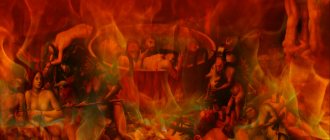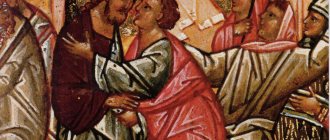Fear of God and love of God - what is it and why?
Estimated reading time: 6 minutes.
Reader question:
In Exodus, God often says to Moses: go and do this..., but I will harden the heart of Pharaoh, and he will not let your people go. He did this in order to show the Jews his strength, so that they would see that God is stronger than Pharaoh. And when I read Exodus, I get the impression that when Pharaoh fights with Israel, it is a fight between two hands belonging to one body, because He could not have hardened Pharaoh's heart. For what?
In Exodus, when Pharaoh released the Jews, the Jews began to leave Egypt, but God again hardened Pharaoh's heart, and Pharaoh decided to destroy the Jews. And then the Lord drowned Pharaoh’s army, in front of the Jews. And then the Jews began to fear (“and the people feared the Lord, and believed the Lord and Moses” (Exodus 14:31)). Here we see how the Jews developed the fear of God, in other words, they saw in the Egyptian soldiers how God could punish.
What do I have...? My “fear” is not the fear that the Jews had. I did not see how God punishes people who do evil, I did not see how justice triumphs.
A Christian must love God... but I know that I love, for example, my mother, my father, before I also loved my first wife, who left me, I loved her very much, I dissolved in this love. I know that there were people in my life whom I loved, but God, did I love him? I think no…
And now I have come to this vision. A Christian must love God, a Christian must fear God, but in most cases the modern Christian cultivates this love and fear himself. Out of a little love for God he tries to grow a bigger one, out of a little fear he tries to scare himself even more. And this love and fear are grown artificially, I’m talking about my own example. For example, I want to have love for God, I want to have fear of God, but I cultivate it myself. I don’t see how God punishes bad people, but I saw how he punishes me in cases where, it would seem, it would be possible not to punish.
Or, for example, I think that if modern atheists saw how God divides the waters of the sea and people can cross this water along the bottom, then I think they would not ask the question “is there a God.” They wouldn't even believe in Him, they would know that He exists. And the faith of the Jews whom He brought out of Egypt differs from ours in that they KNOW, and do not just believe. But a modern Christian believes either because he wants to believe, or he grows his faith, seemingly out of nothing.
Priest Peter Guryanov answers:
Priest Peter GURYANOV
Good evening, Dmitry! Love for people is a manifestation of love for God. The Lord speaks well about this in the Gospel: for I was hungry, and you gave Me food; I was thirsty and you gave Me something to drink; I was a stranger and you accepted Me; I was naked and you clothed Me; I was sick and you visited Me; I was in prison, and you came to Me.
Then the righteous will answer Him: Lord! when did we see you hungry and feed you? or to the thirsty and gave them something to drink? when did we see you as a stranger and accept you? or naked and clothed?
When did we see You sick, or in prison, and came to You? And the King will answer them, “Truly I say to you, just as you did it to one of the least of these brothers of Mine, you did it to Me.” Then He will also say to those on the left side: Depart from Me, you cursed, into the everlasting fire prepared for the devil and his angels:
For I was hungry, and you gave Me no food; I was thirsty, and you gave Me no drink; I was a stranger, and they did not accept Me; I was naked, and they did not clothe Me; sick and in prison, and they did not visit Me. Then they too will answer Him: Lord! when did we see You hungry, or thirsty, or a stranger, or naked, or sick, or in prison, and did not serve You? Then he will answer them, “Truly I say to you, just as you did not do it to one of the least of these, you did not do it to Me.” And these will go away into everlasting punishment, but the righteous into everlasting life.
The fear of God is the action of the grace of the Holy Spirit in the human heart, giving a person a feeling of the Divine presence and the fear of offending God with a sinful thought and deed.
“The fear of God cannot be compared to any feeling of a carnal, even spiritual, person. The fear of God is a completely new feeling. The fear of God is the action of the Holy Spirit. Having felt the fear of God, having felt the presence of God from the action of the fear of God during your prayer, you will see the Invisible in a formless, spiritual way, you will know that prayer is a presence at the Last Judgment of God” Bishop Ignatius (Brianchaninov).
What does the Old Testament describe? It describes the creation of man, the life of the first people on earth. Further, the Old Testament describes the history of one Jewish people, once chosen by God. What is the meaning of Old Testament history? Humanity in its entirety has moved so far away from the One True God, so lost the awareness of eternity, the awareness that there is a soul in man, that there are certain laws of spiritual life that no one can transgress - so terrible was the darkness of all humanity that it was the only way to save humanity. God chose one people among the entire huge mass of pagans who worshiped the works of their own hands - idols, who worshiped the devil, who carried all of humanity into eternal destruction. So, the Lord chose one people and led this people for several thousand years in order to produce from them our Most Holy Lady, Ever-Virgin Mary, who became the Mother of God. Through Her God was able to become incarnate. Not through the pagans who did not know God, but through the best representative of humanity - the Mother of God. But in order for the rude, stiff-necked, as the Bible calls it, the Jewish people to listen to God, they must be completely separated from all other peoples mired in paganism. The cult of Moloch with child sacrifices alone is worth it! Separation from the rest of humanity was carried out with a harsh hand, because otherwise the Jews immediately betrayed God and fell into paganism and Satanism. With a hard hand, the Lord led this stiff-necked people to true spiritual freedom. And only in their chosen people - in the Mother of God, in the apostles, in the first Christians - were the Jews able to rise to the level that God desired. The rest all betrayed Christ.
The apparent cruelty of the Lord is the cruelty of a loving Father. What do father and mother do when they see that their son is getting involved with bad company and could become a criminal or drug addict? They cut off all communication: they beat the child, isolate him, move to another city, go into the desert... Similar things happened in the Old Testament, it was even worse. When the Jews conquered the promised land, i.e. promised by God, there was a threat that they would instantly become corrupted along with the pagans who lived there. In those rough and terrible centuries, it was necessary to exterminate these pagans so that the only umbilical cord connecting humanity and God would not be broken. Otherwise the Jews would have become completely corrupted.
One of the holy fathers says that it was not in vain that the Lord chose one of the most cruel, most rebellious peoples, in order to lead all humanity through it to the acceptance of the Savior, and thereby set an example for all other peoples. Therefore, when we read the Bible, we see the entire course of human history - not only the Old Testament, but also the New Testament. This book is an eternal example for us and an eternal source of historical and spiritual analogies in order to learn how to be faithful to God, how to cut off every sin of infidelity and doubt. This is a great book - a textbook for all of us. And sometimes this textbook can be cruel and strict, but everything in it is aimed at the salvation of each individual person and for the salvation of all humanity.
Fear of the Lord: more than just respect, but at the same time not panic horror.
Depending on what they have been taught, people understand the fear of the Lord differently: some consider it a kind of terror, a feeling of fear of God; others consider it a simple sign of respect, similar to the one they show, say, to their work colleagues or... they do not understand at all what it is, considering this concept outdated in our age of grace. I think that neither of these points of view is close to the truth. Let's start with the concept of ordinary respect: the respect that exists between equals is not at all the same as the respect due to the Almighty. The respect that a subject of a king shows to subjects like himself and the respect that he shows to the king are completely different things. Even if he has boldness before the throne of the king, as we have boldness before the throne of God through the blood of Christ, even if he himself is the son of the King, as we are by faith, he still remains a subject in relation to the King. And any king, not to mention the King of kings, should be given proper honor. In other words, the fact that we are children of the King does not negate the reverence and deepest respect that we should show to the King, the Most High, nor does it reduce them to the level of ordinary respect that we show to other subjects.
However, the king's son still comes to the king differently than any other person would come. The king's son does not tremble before him with fear, but comes fearlessly and confidently, knowing that the king to whom he is addressing is his loving Father. At the same time, as mentioned above, he comes to him with the deepest respect, not forgetting that he is addressing not just a comrade, but his Father, Who is also the Most High God, the Lord of lords and the King of kings. Thus, the fact that we are children of God also means that the fear of the Lord should not be understood by us as panic and fear of the King, but rather as the deepest respect and honor inherent in the relationship of children with the most loving Father, Who is also it's time and the Creator of everything, the Almighty God.
From this explanation we move on to passages showing the greatness of God and related to the fear of the Lord. I present these passages as evidence of the splendor and greatness of God, without thereby wishing to suggest that Christians should fear and be terrified of God. As we have already said and will continue to say, fear of God does not mean fear of God. I think that in our time, when the gap between God and man has been eliminated by Christ, to have the fear of God for us means to come to Him as to the Father (with confidence and without fear), not forgetting at the same time that He is the Most High God ( and worthy of deepest respect). Turning to the above passages, let's start with Jeremiah 10:6-7:
Jeremiah 10:6-7 “There is none like You, O Lord! You are great, and Your name is great in power. Who will not fear You, King of nations?”
and Revelation 15:4 “Who will not fear You, O Lord, and glorify Your name?”
and Jeremiah 5:22-24 “Do you not fear Me, says the Lord, do you not tremble at Me? I have set the sand as the border of the sea, an eternal limit that cannot be crossed; and although its waves rush, they cannot overcome it; although they rage, they cannot cross it. But this people has a violent and rebellious heart; they retreated and walked; And they did not say in their hearts: “Let us fear the Lord our God, who gives us the early and the latter rain in its season, who keeps for us the weeks appointed for the harvest.”
Psalm 33:6-9 “By the word of the Lord were the heavens made, and by the breath of his mouth all their hosts: he gathered up the waters of the sea like heaps, and laid up the deep in storehouses. Let all the earth fear the Lord; Let all who live in the universe tremble before Him, for He spoke and it was done; He commanded, and it appeared.”
GOD CREATED US AND THE WHOLE UNIVERSE. EVERYTHING, VISIBLE OR INVISIBLE, WAS CREATED BY HIS HAND. He is our Father and our Lord. He is the Most High. Knowledge of the Scriptures without reverence and awe of the greatness of God is only knowledge of the mind, as a rule, leading to pride (1 Corinthians 8:1). As it is written in Proverbs:
Proverbs 2:1-5 “My son! if you accept my words and keep my commandments with you, so that your ear is attentive to wisdom and your heart is inclined to meditation; if you call on knowledge and appeal to reason; if you search for it as for silver and search for it as for treasure, THEN you will understand the fear of the Lord and find the knowledge of God.”
Only if the Word of God is stored in us, and if it takes root in our hearts, can we understand the fear of the Lord. If we do not have reverence for the Almighty, then all our knowledge of Scripture is only knowledge of the mind, which, not being rooted in the heart, will not bear fruit, but will become the cause of pride.
Respect and reverence for God.
The fear of God is not the fear of a tyrant or dictator. We do not need to fear His wrath unless we fear punishment due to a bad conscience and an unrepentant heart due to sin. (Rom. 2:5-9)
The fear of God is deep respect and reverence for Almighty God, the Creator of everything. Several times in the Bible we are given the opportunity to look into the heavens and see the heavenly beings continually worshiping God around His throne, crying out, “Holy, holy, holy!” and covering their faces. This Almighty God called me by name and called me to serve Him. He works in me so that I can be saved and be with Him for eternity. This should evoke inexpressible love, gratitude and respect in my heart, which will only grow and multiply!
This makes us afraid to sin against Him, because what we want most in this world is to please Him and bring honor to His name. We are afraid to grieve Him, knowing how insignificant sin is and how God hates it, knowing what pain we cause Him when we sin.
“So, Israel, what does the Lord your God require of you? Only that you fear the Lord your God, walk in all His ways, and love Him, and serve the Lord your God with all your heart and with all your soul, so that you keep the commandments of the Lord and His statutes, which I am commanding you today, May it be good for you.”
Deut. 10:12-13.
“The fear of the Lord is to hate evil; I hate pride and arrogance and the evil way and deceitful lips.”
Proverbs 8:13.
To fear God means to do His will.
Developing the above thoughts further, I want to say that I do not understand how a person can do the will of the Lord without having proper fear of Him, and how a person can fear God without doing His will. To fear God means to do His will. This means taking a step of faith and doing as God commands, even if we do not find a logical explanation for the situation and cannot see the full picture of what is happening. Those who fear God will strive to do the will of God. Any command of the Father is of paramount importance for them and is not subject to discussion, for it comes from the mouth of the Father Himself. Fear of the Lord, deepest reverence for Him and His will, and obedience to the Lord and His will will then accompany each other. Just imagine naughty children. Can we say that such children respect their father? Perhaps they come to him to get what they want from him, but they have no love or respect for him. If they loved him, they would respect his will and carry it out. Unfortunately, there are similar Christians who come to God only out of great need; the rest of the time they live according to the laws of the world. Naturally, this should not continue. Instead of this type of behavior, we should deepen our relationship with God by seeking first the kingdom of God and His righteousness, and all other things will be added to us (Matthew 6:33). We are to follow in the footsteps of our Lord Jesus Christ as written in Philippians 2:5-11:
Philippians 2:5-11 “For let this mind be in you which was also in Christ Jesus: He, being in the form of God, did not consider it robbery to be equal with God; but he made himself of no reputation, taking the form of a servant, becoming in the likeness of men, and becoming in appearance like a man; He humbled Himself, becoming obedient even to the point of death, even death on the cross. Therefore God has highly exalted Him and given Him the name that is above every name, so that at the name of Jesus every knee should bow, in heaven and on earth and under the earth, and every tongue should confess that Jesus Christ is Lord, to the glory of God the Father.”
Scripture says that we should have the same feelings that were in our Lord Jesus Christ. What feelings did He have? His feelings were readiness for obedience, obedience even to death. His motto was, “Not my will, but yours, be done” (Luke 22:42).
With all of the above, I want to emphasize that we cannot say with all confidence that we have the fear of the Lord if we do not do His will. The same principle applies to loving the Lord. As He Himself said:
John 14:23-24 “...if anyone loves Me, he will keep My word; and My Father will love him, and We will come to him and make our abode with him. He who does not love Me does not keep My words; But the word that you hear is not Mine, but the Father’s who sent Me.”
We cannot say that we love the Lord if we do not do what He commands us. In the same way, I think we cannot say that we fear the Lord if we know what His will is but do not do it.
To conclude this section, let us repeat once again: the fear of the Lord implies obedience to the Lord. Fear of the Lord means having a high regard for God and His will, despite the circumstances. In short, it means putting God and His will above all else.










